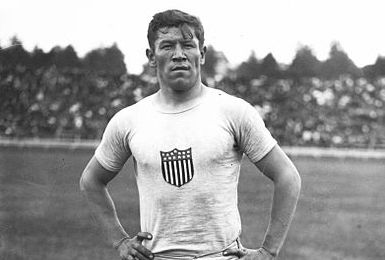
- Details
- By Levi Rickert
Native Currents Update
LOS ANGELES, Calif. — A petition that calls on the International Olympic Committee (IOC) to restore the record of Jim Thorpe as the sole champion in the pentathlon and decathlon events at the 1912 Olympic Games is still short of its goal of 100,000 signatures before the end of 2020.
Launched in July, by Bright Path Strong, the National Congress of American Indians, and several of Jim Thorpe’s descendants, the “Take Back What Was Stolen” intiative is bringing attention to an injustice to Jim Thorpe's legacy.
On July 15, 1913, Thorpe (Sac and Fox, Potawatomi) was awarded two Olympic gold medals at the Stockholm Olympic Games. When King Gustav awarded him two Olympic gold medals the king said to him, “You, sir, are the greatest athlete in the world.”
The next year after his Olympic victory, the IOC stripped Thorpe of his two gold medals and struck his name from the Olympic history books. Thorpe set incredible records in track and field.
However, the IOC did not go far enough.
They neglected to restore Thorpe’s records and relegated him to co-champion––the silver winners, the athletes he’d previously beaten, had their silver medals elevated to gold when Thorpe was stripped of his remarkable achievements. The IOC allowed those athletes to keep their golds.
The “Take Back What Was Stolen” petition calls for the IOC to make things right, to take the necessary steps to correct history and restore Thorpe’s proper status as the sole gold medalist in both the decathlon and pentathlon.
More Stories Like This
Native News Weekly (August 25, 2024): D.C. BriefsUS Presidents in Their Own Words Concerning American Indians
Ethics Complaint Alleges Former Navajo Nation Chief of Staff Accepted Gifts From Contractor
Monday Morning (December 14, 2025): Articles You May Have Missed This Past Weekend
Native News Weekly (December 14, 2025): D.C. Briefs
Help us defend tribal sovereignty.
At Native News Online, our mission is rooted in telling the stories that strengthen sovereignty and uplift Indigenous voices — not just at year’s end, but every single day.
Because of your generosity last year, we were able to keep our reporters on the ground in tribal communities, at national gatherings and in the halls of Congress — covering the issues that matter most to Indian Country: sovereignty, culture, education, health and economic opportunity.
That support sustained us through a tough year in 2025. Now, as we look to the year ahead, we need your help right now to ensure warrior journalism remains strong — reporting that defends tribal sovereignty, amplifies Native truth, and holds power accountable.
 The stakes couldn't be higher. Your support keeps Native voices heard, Native stories told and Native sovereignty defended.
The stakes couldn't be higher. Your support keeps Native voices heard, Native stories told and Native sovereignty defended.
Stand with Warrior Journalism today.
Levi Rickert (Potawatomi), Editor & Publisher

